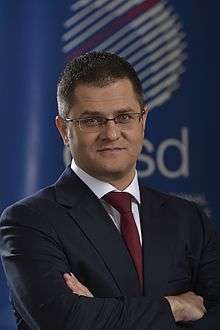People's Party (Serbia, 2017)
The People's Party (Serbian: Народна странка, НС / Narodna stranka, NS) is a liberal conservative political party in Serbia. It is a centre-right political organization in Serbia, founded after 2017 presidential elections, by Vuk Jeremić. The party currently has three members serving in the National Assembly.
People's Party Народна странка Narodna stranka | |
|---|---|
.svg.png) | |
| President | Vuk Jeremić |
| Founders | Vuk Jeremić Miroslav Aleksić |
| Founded | 22 October 2017 |
| Headquarters | Belgrade |
| Ideology | Liberal conservatism Pro-Europeanism Decentralization[1] |
| Political position | Centre-right |
| National affiliation | Alliance for Serbia |
| National Assembly | 0 / 250 |
| Assembly of Vojvodina | 1 / 120 |
| City Assembly of Belgrade | 7 / 110 |
| Website | |
| www | |
History
After his unsuccessful bid in an attempt to replace Ban Ki-Moon as UN Secretary-General in the end of 2016, Vuk Jeremić returned to Serbia, where he enjoyed relatively high approval ratings compared to other opposition politicians. He decided to run for president in 2017 presidential election, declining the option to support Saša Janković, who by then managed to gather a number of parties' support. Although many thought that opposition would have better chances against Vučić if united and considered Janković a better option for a single opposition presidential candidate,[2] Jeremić announced his candidacy nevertheless.[3] He finished fourth, with little less than 6% of the vote.
In the aftermath of the election though his results were quite disappointing, he announced he will form a party. He gathered support for such move mainly from conservative intellectuals who were opposing Vučić's government and were previously tied with DSS (most notably Sanda Rašković-Ivić, a former DSS president). He formed the People's Party in October 2017. The People's Party was able to forgo the usual registration process for new parties when Miroslav Aleksić, a member of the National Assembly, allowed his People's Movement of Serbia to be re-registered and re-constituted under the new party name. Representatives of the People's Party indicated that this removed the threat of the name being stolen during the registration process.[4]
As of December 2017, there are three members of the People's Party serving in the National Assembly, although they do not serve as a unified parliamentary bloc. Aleksić, who was selected as first vice-president of the People's Party at its founding convention, has served in a parliamentary alliance with Boris Tadić's Social Democratic Party since 2016 and is the deputy leader of the grouping.[5][6] Rašković Ivić, who was selected as one of five deputy vice-presidents at the same convention, is the current leader of the New Serbia–Movement for Serbia's Salvation group.[7] Dijana Vukomanović, a former member of the Socialist Party of Serbia who now serves on the presidency of the People's Party,[8] is also a member of the New Serbia–Movement for Serbia's Salvation caucus.[9]
Another member of the National Assembly, Đorđe Vukadinovć is also closely tied to the party, and supported it since its inception. He was elected as part of the same list as Sanda Rašković-Ivić (Dveri-DSS) but later went independent.
Political position
Since its inception the party has positioned itself as an opposition party to the government, led by Serbian Progressive Party (SNS). Jeremić stated he is a pro-EU politician, but he opposes Serbia joining NATO.[10][11]
Despite competing against each other in the presidential election, Jeremić's party now cooperates closely with the Movement of Free Citizens, a party formed by Janković, after the election.
Presidents of the People's Party
| # | President | Born–Died | Term start | Term end | |
|---|---|---|---|---|---|
| 1 | Vuk Jeremić |  |
1975– | 22 October 2017 | Incumbent |
Election results
People’s party participated in Belgrade Assembly elections through Dragan Đilas list. They won 19%.
See also
References
- "Program Narodne stranke". Narodna Stranka.
- "Janković jači kandidat opozicije od Jeremića".
- "Jeremić odlučio da se kandiduje za predsednika Srbije".
- "'Blic': Jeremić u oktobru osniva Narodnu stranku, B92, 28 September 2017, accessed 20 November 2017.
- "Former FM Jeremic becomes leader of newly founded party", B92, 23 October 2017, accessed 20 November 2017.
- Social Democratic Party, People’s Movement of Serbia Parliamentary Group, National Assembly of Serbia, accessed 26 January 2017 and 20 November 2017.
- New Serbia – Movement For Serbia’s Salvation Parliamentary Group, National Assembly of Serbia, accessed 27 November 2017.
- Председништво Народне странке, People's Party, accessed 5 December 2017. See also M. Stojanović, "Vukomanović: Narodna stranka će umiriti borbu desnice i levice", Danas, 29 September 2017, accessed 5 December 2017.
- DIJANA Dr VUKOMANOVIC, National Assembly of Serbia, accessed 5 December 2017.
- "Jeremić: Uprkos krizi EU, nama je potrebno evropsko društvo".
- "Jeremić: Nikad u NATO, vojna neutralnost da se unese u Ustav".